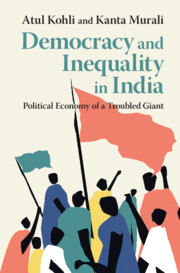
-
Select format
-
- Publisher:
- Cambridge University Press
- Publication date:
- October 2025
- October 2025
- ISBN:
- 9781108559287
- 9781108471831
- 9781108458559
- Dimensions:
- (229 x 152 mm)
- Weight & Pages:
- 0.696kg, 360 Pages
- Dimensions:
- (229 x 152 mm)
- Weight & Pages:
- 0.523kg, 360 Pages
You may already have access via personal or institutional login
Book description
Contemporary India provides a giant and complex panorama that deserves to be understood. Through in-depth analysis of democracy, economic growth and distribution, caste, labour, gender, and foreign policy, Atul Kohli and Kanta Murali provide a framework for understanding recent political and economic developments. They make three key arguments. Firstly, that India's well-established democracy is currently under considerable strain. Secondly, that the roots of this decline can be attributed to the growing inequalities accompanying growth since the 1990s. Growing inequalities led to the decline of the Congress party and the rise of the BJP under Narendra Modi. In turn, the BJP and its Hindu-nationalist affiliates have used state power to undermine democracy and to target Indian Muslims. Finally, they highlight how various social groups reacted to macro-level changes, although the results of their activism have not always been substantial. Essential reading for anyone wishing to understand democracy in India today.
Reviews
‘A comprehensive, erudite, and immensely readable account of a vast and complex subject. Kohli and Murali explore the impact of growth and economic inequality on India’s democracy, with a thoroughness and depth of scholarship that make this volume an invaluable companion to contemporary India.’
Niraja Gopal Jayal - author of Citizenship and its Discontents: An Indian History
‘This thoughtful and nuanced account by two seasoned scholars of India is essential reading for anyone wanting to understand the country today.’
Prerna Singh - author of How Solidarity Works for Welfare: Subnationalism and Social Development in India
‘Kohli and Murali have produced the most comprehensive scholarly treatment of the Modi era yet. They cover a whole range of important political issues, including caste, gender, labor, regional disparities and India’s changing relationship to the world. Economic growth and distribution constitute an important core of the book. Significantly, they argue that India’s democratic backsliding is linked to the nation’s rising economic inequalities. A book that should be widely read.’
Ashutosh Varshney - author of Battles Half Won: India's Improbable Democracy
Contents
Metrics
Full text views
Full text views help Loading metrics...
Loading metrics...
* Views captured on Cambridge Core between #date#. This data will be updated every 24 hours.
Usage data cannot currently be displayed.
Accessibility standard: Missing or limited accessibility features
Why this information is here
This section outlines the accessibility features of this content - including support for screen readers, full keyboard navigation and high-contrast display options. This may not be relevant for you.
Accessibility Information
The PDF of this book is known to have missing or limited accessibility features. We may be reviewing its accessibility for future improvement, but final compliance is not yet assured and may be subject to legal exceptions. If you have any questions, please contact accessibility@cambridge.org.
Content Navigation
Table of contents navigation
Allows you to navigate directly to chapters, sections, or non‐text items through a linked table of contents, reducing the need for extensive scrolling.
Index navigation
Provides an interactive index, letting you go straight to where a term or subject appears in the text without manual searching.
Reading Order and Textual Equivalents
Single logical reading order
You will encounter all content (including footnotes, captions, etc.) in a clear, sequential flow, making it easier to follow with assistive tools like screen readers.
Structural and Technical Features
ARIA roles provided
You gain clarity from ARIA (Accessible Rich Internet Applications) roles and attributes, as they help assistive technologies interpret how each part of the content functions.

